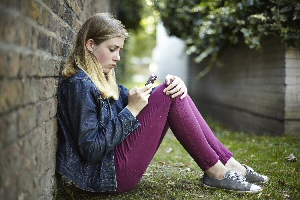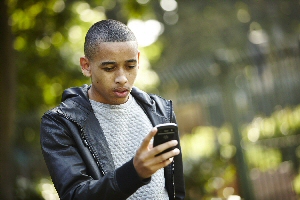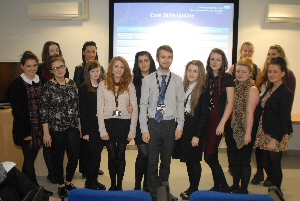|
New partnership
to help young people remove explicit images online
Photographs in this report are by Jon Challicom and
posed by models.

ACTION taken as new survey
reveals 60% of young people have been asked for a sexual image or
video and 40% have created an image or video of themselves
ChildLine and the Internet Watch Foundation (IWF) are joining forces
to ensure young people of 17 years and under know where to turn to
get sexually explicit images removed from online. The partnership
comes as a result of a ChildLine survey of 13-18 year olds which
revealed that young people are frequently taking huge risks by
making and sending sexual images of themselves.
Shockingly, 60% of the young people questioned said they had been
asked for a sexual image or video of themselves, demonstrating a
concerning prevalence and an immense pressure on young people to
participate. 40% said they had created an image or video of
themselves, with around a quarter of all those questioned saying
they had sent the image or video to someone else.
Over half of the young people surveyed by ChildLine said they had
received a sexual photo or video, most received them from a partner
but a third received them from a stranger. Whilst most said the
image went to a boyfriend or girlfriend, a third said they sent it
to someone they met online but didn't know in real life and 15% said
they had sent it to a total stranger.
Labelled as 'sexting', the sharing of self-generated sexually
explicit images or videos by mobile phone or online is now
commonplace amongst young people to the point that it is considered
'mundane'.
James*, 17, revealed that he
continues to engage in sending and receiving images, despite the
risks:- "Sexting is really pretty normal at my age. It seems
like everyone's doing it. There are definitely risks involved.
Someone saw a video message I had sent to a previous girlfriend,
took a screen shot and posted it online. They called me a pervert
and lots of people I knew saw it. I was completely devastated and,
to be honest, almost suicidal. I've never pressured anyone into sexting, and when any girl I've been seeing hasn't been interested
I've been fine with that. There are some people though who will put
pressure on you. I do worry about who is behind the phones
of the people I sext with, obviously if you don't know the person
in real life there's no guarantee that they are who they say they
are. There is also a big risk around the ages of the girls you
contact. Of course you can ask, but there's no proof that they're
telling the truth."
Since NSPCC commissioned research uncovered a worryingly increasing
trend for 'sexting' and a fear amongst young people of
turning to adults for help when things go wrong, ChildLine has been
committed to providing young people with support to tackle the
issue.
Peter Liver, Director of ChildLine Services, said:- "In
contrast to the scale of the problem, few young people are calling ChildLine to talk about the issue, whether for fear of being judged
or being reported to the authorities. Most common contacts to
ChildLine are when the issue has escalated beyond their control. It
is essential we are able to support young people to talk to
ChildLine before an issue escalates but also that we are able to
help them to deal with removing images from online. The sharing of
these images does not necessarily happen in isolation, it can be
related to other online issues such as cyber bullying and draw from
influences such as celebrity and easy access of online pornography.
Our partnership with the IWF means that we can help young people to
verify their age before logging a complaint to get the image removed
swiftly and efficiently."

Susie Hargreaves, IWF CEO said:-
"We're delighted to be
partnering with ChildLine as we have sadly tracked a marked rise in
self-generated sexual content featuring young people. A snapshot
study conducted by IWF analysts over a 47 hour period found well
over 12,000 self-generated images and videos of young people online.
Most recently, we see images and videos being gathered together and
sold for commercial gain. The IWF works strictly within UK law; we
have to be certain that the image features someone under the age of
18 which is why this partnership with ChildLine is all the more
important to ensure we can receive the information to remove
explicit content as soon as possible."
As part of their focus on the issue, ChildLine have also developed
their first app for young people designed to provide tools to defuse
the pressures to send an explicit image. Called 'Zipit' the app
offers witty images to send instead of explicit ones, advice for how
to engage in safe chat, what to do if you feel threatened or if an
image becomes public and a direct link to call ChildLine. The app
will be available later this month.
Peter Liver continued:- "With the constant rise in smart
technology being made available to young people, the self-generating
and sharing of sexually explicit images is not a 'fad' that will go
away. We know that threatening young people with the consequences of
their actions is not the most impactful way to engage them, in a
similar way as telling them not to drink or smoke. The app means we
are providing young people with a tool to help them deal with or
remove the pressure to engage in it."
* Names have been changed to protect identity.
Also these photographs are of models!
PRIMARK FALL - WOMAN DIES
A 57 year old
woman woman has died in Liverpool hospital on Tuesday, 22 October
2013 following an incident at a store in Liverpool City Centre.
Merseyside Police Officers were called to the Primark store in
Church Street, 6pm, on 22 October, by Paramedics following a report
a woman had fallen from the 3rd floor. The lady who has been
formally identified was taken to hospital by Ambulance, were she
unfortunately died a short time later. The next of Kin do not want
the woman's name to be released to the public and anyone who knows
her name is being asked out of respect to the family not to release
it. At this time the death if not being treated as suspicious and
the matter has been referred to the coroner. |
 |
Changes to hospital parking fees and penalties
PARKING
penalties for motorist have been cut at Southport and Ormskirk
hospitals, but Geoff Wilding, Facilities Manager, has told
the media that:- "The fixed penalty notices fee has
fallen from £60 to £30, providing it is paid within 14 days. We
have agreed this with UK Parking Control, the company that
monitors parking on the Trust's behalf, in response to feedback
from visitors." The penalty for notices unpaid
after 14 days also falls from £120 to £60. UK Parking
Control Ltd. issues penalty notices to drivers who park in Blue
Badge spaces they are not entitled to, park on pavements, park
on double yellow lines, or block access to essential clinical
services and emergency services such as ambulances and fire
engines. The Trust receives no income from fixed penalty
notices which fund UK Parking Control's management costs.
Parking charges for some
visitors will increase as of 1 November 2013.
Parking for staff
will also cost more.
|
VISITORS |
Up to
31/10/2013 |
From 1/11/2013 |
|
Up to
20mins |
FREE |
No
charge |
|
20mins to 2hrs |
£2.80 |
£2.90 |
|
2hrs
to 4hrs |
£3.40 |
Unchanged |
|
4hrs
to 8hrs |
£4.10 |
£4.20 |
|
Over
8hrs |
£5.20 |
Unchanged |
|
Weekly pass |
£10 + £10 deposit |
Unchanged |
|
3
month pass |
£30 + £10 deposit |
Unchanged |
|
STAFF |
|
Up to
20hrs |
£170 a year |
£172
a year |
|
More
than 20hrs |
£340 a year |
£344
a year |
|
Designated parking |
£565 a year |
£570
a year |
Director of Finance
Damian Reid said:- "The Board agreed 2 years ago that
charges should rise in line with the cost of living, but we have
decided to keep the increase this year to the equivalent of 1%.
Income from parking charges goes towards the cost of maintaining
and managing the car parks. The remainder goes directly to
patient care."
The Trust also plans
some changes to parking arrangements in the months ahead
including the introduction of supermarket style mother and baby
spaces, particularly for women's and children's services at
Ormskirk hospital.
Damian added:-
"We are also investigating new ticketing arrangements in a bid
to reduce delays and improve the experience for visitors."
Young healthcare
students in training at the Liverpool UTC to undertake work
experience with the Royal

STUDENTS enrolling on
healthcare courses at the new University Technical College (UTC) on
Greenland Street, will get first-hand experience of the skills
needed to care for patients thanks to a unique partnership with the
Royal.
Around 200 work experience placements a year will be available for
UTC students aged 16 and above in clinical and non-clinical areas at
the Royal Liverpool University Hospital, Broadgreen Hospital and the
Liverpool University Dental Hospital.
Jo Marinas clinical skills training manager at the Trust said:-
"This will be a great experience for these 16 to 19 year olds who
will be shadowing and observing staff in their roles. Not only will
they see how clinical staff care for patients, they will also get a
real insight into the wide range of career opportunities available
in healthcare both in clinical and non-clinical roles. They will
each receive induction training beforehand so that they understand
our values and practices and are trained in cores skills such as
compassionate care, infection control and patient confidentiality."
Around 20 students recently had their core skills induction training
ahead of starting their placements in the coming weeks.
18 year old Polly Rooke from Prenton on the Wirral said:-
"I've always wanted to look after people and see the University
Technical College as a gateway to a career in nursing. I'm looking
forward to starting my work experience and learning about all the
different roles there are in hospitals."
Hannah Johnston, 17 from Kirkby said:- "I enrolled with the
University Technical College as I want to work as a Clinical
Bio-Chemist. At the UTC we have carried out a number of experiments
that university students do. I'm looking forward to seeing the work
that is undertaken in the pathology laboratories at the hospital, as
this is what I want to do in the future."
Liverpool Life Sciences UTC is the first in the country to
specialise in Science and Healthcare, with academic and professional
qualifications including GCSEs, BTECs, A-Levels and NVQs. The
partnership with the Royal will ensure that local 14 to 19 year olds
will be equipped with the technical skills and a range of
qualifications to enable them to take full advantage of the job
opportunities in health and life sciences that will be created with
the development of the new Royal and the BioCampus which will follow
on the site of the current hospital. The BioCampus will provide
100,000 square metres of development space for companies involved in
research, pharmaceutical and biomedical industries and will create
around 5,000 high-tech, high value jobs.
In addition staff at the Royal have been working closely with
teachers at the UTC to develop the core curriculum and training
materials for students.
Jo Marinas, said:- "Our teams have worked closely with the UTC
in all aspects of the health sciences curriculum. We developed the
teaching topics to target what we know are the main health issues
faced by the local population. These include cancer, diabetes,
respiratory illnesses, care for the elderly and alcoholic liver
disease.
We have also helped to design and equip the healthcare education
rooms at the UTC to ensure they provide a realistic environment for
students to test out their skills and knowledge. There will be a
treatment area equipped with a 'Sim Man' (an electronic, life-like
patient simulator designed to replicate real life scenarios) to
provide students with realistic interaction with how patients react
to various health conditions. We also helped to select the equipment
for the UTC's laboratories so that students can replicate some of
the work carried out in a clinical lab."
Lyndsay MacAulay, Director of Enterprise at the UTC said:-
"Partner organisations like the Royal are an essential element of
the UTC. Their support provides huge benefits to our students
including, working with a network of trained clinical professionals,
understanding the context of their learning and putting the skills
into practice whilst out on placement. All essential experiences for
students who are hoping to access careers in health care and
sciences. This will in turn help us to provide ready made trainee
medics, nurses and pharmacists to train to work in the new Royal and
ensure local students are qualified to access some of the 5,000
roles that will be created with the BioCampus."
|